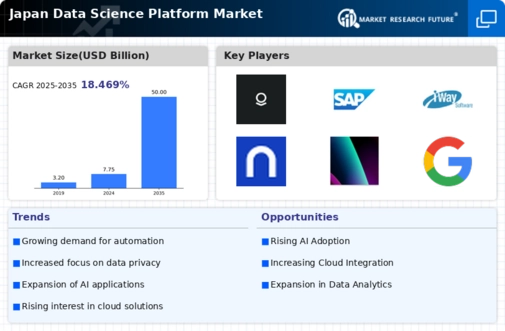The competitive dynamics within the data science platform market in Japan are characterized by a blend of innovation, strategic partnerships, and a focus on digital transformation. Key players such as IBM (JP), Microsoft (JP), and Google (JP) are at the forefront, each leveraging their technological prowess to enhance their market positioning. IBM (JP) emphasizes its commitment to AI and machine learning, aiming to integrate these technologies into various sectors, thereby driving operational efficiencies. Microsoft (JP) focuses on cloud-based solutions, enhancing its Azure platform to cater to the growing demand for scalable data analytics. Meanwhile, Google (JP) is investing heavily in machine learning capabilities, positioning itself as a leader in AI-driven data solutions. Collectively, these strategies foster a competitive environment that is increasingly reliant on technological advancements and collaborative efforts.
In terms of business tactics, companies are localizing their operations to better serve the Japanese market, optimizing supply chains to enhance efficiency. The market structure appears moderately fragmented, with several players vying for dominance. However, the influence of major companies is substantial, as they set benchmarks for innovation and service delivery, thereby shaping the competitive landscape.
In December 2025, IBM (JP) announced a strategic partnership with a leading Japanese automotive manufacturer to develop AI-driven analytics solutions aimed at optimizing production processes. This collaboration is significant as it not only showcases IBM's commitment to industry-specific solutions but also highlights the growing trend of integrating AI into traditional manufacturing sectors, potentially leading to enhanced productivity and reduced operational costs.
In November 2025, Microsoft (JP) launched an initiative to expand its Azure cloud services in Japan, focusing on providing tailored solutions for small and medium-sized enterprises (SMEs). This move is strategically important as it addresses the unique needs of SMEs, which are increasingly recognizing the value of data analytics in driving business growth. By catering to this segment, Microsoft (JP) is likely to enhance its market share and foster long-term customer loyalty.
In October 2025, Google (JP) unveiled a new suite of machine learning tools designed specifically for the Japanese market, aimed at improving data accessibility and usability for local businesses. This initiative underscores Google's strategy to deepen its engagement with Japanese enterprises, potentially leading to increased adoption of its data science platforms. The introduction of localized tools may also enhance user experience, thereby solidifying Google's competitive edge in the region.
As of January 2026, the prevailing trends in the data science platform market include a strong emphasis on digitalization, sustainability, and the integration of AI technologies. Strategic alliances are increasingly shaping the competitive landscape, as companies recognize the value of collaboration in driving innovation. Looking ahead, competitive differentiation is likely to evolve, with a shift from price-based competition to a focus on technological innovation and supply chain reliability. This transition suggests that companies will need to invest in cutting-edge technologies and sustainable practices to maintain their competitive advantage.

























